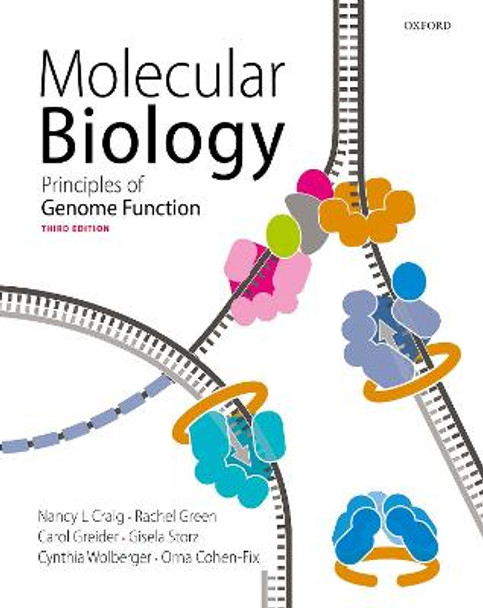Description
2022 BMA Awards Basic and Clinical Sciences and Research Winner
About the Author
Nancy L Craig received an A.B. in Biology and Chemistry from Bryn Mawr College in 1973 and a Ph.D. in Biochemistry in 1980 at Cornell University, where she worked on DNA repair with Jeff Roberts. She then worked on phage lambda recombination as a postdoctoral fellow with Howard Nash at the National Institutes of Health. She joined the faculty of Microbiology and Immunology at the University of California, San Francisco in 1984 and began her work on transposable elements. She joined the Department of Molecular Biology and Genetics at the Johns Hopkins University School of Medicine in 1991, where she is currently a Professor and a Howard Hughes Medical Institute Investigator, as well as the recipient of the Johns Hopkins University Alumni Association Excellence in Teaching Award. She is a Fellow of the American Academy of Microbiology, the American Academy of Arts and Sciences and the American Association for the Advancement of Science, and was elected to the National Academy of Sciences. Rachel Green received a B.S. in chemistry from the University of Michigan in 1986 and a Ph.D. in Biological Chemistry from Harvard University in 1992, where she worked with Jack Szostak studying catalytic RNA. She then did postdoctoral work in the laboratory of Harry Noller at the University of California, Santa Cruz, studying the role played by the ribosomal RNAs in the function of the ribosome. She is currently a Professor in the Department of Molecular Biology and Genetics at The Johns Hopkins University School of Medicine, an Investigator of the Howard Hughes Medical Institute, and a member of the National Academy of Sciences. Her work continues to focus on the mechanism and regulation of translation in bacteria and eukaryotes. She is the recipient of a Johns Hopkins University School of Medicine Graduate Teaching Award. Carol Greider received a B.A. from the University of California at Santa Barbara in 1983. In 1987, she received her Ph.D. from the University of California at Berkeley, where she worked with Elizabeth Blackburn, and co-discovered telomerase. In 1988, she went to Cold Spring Harbor Laboratory and was promoted to Senior Staff Scientist. In 1997 she moved to The Johns Hopkins University School of Medicine where she is currently the Daniel Nathans Professor and Director of the Department of Molecular Biology and Genetics, and a Bloomberg Distinguished Professor. Her work focuses on the mechanisms of telomere length regulation and short telomere syndromes, as well as telomeres in cancer. She is a member of the National Academy of Sciences and is the recipient of numerous awards. In 2009, she was awarded the Nobel Prize in Physiology or Medicine together with Elizabeth Blackburn and Jack Szostak for the discovery of telomerase. Gisela Storz graduated from the University of Colorado at Boulder in 1984 with a B.A. in Biochemistry and received a Ph.D. in Biochemistry in 1988 from the University of California at Berkeley, where she worked for Bruce Ames. After postdoctoral fellowships with Sankar Adhya at the National Cancer Institute and Fred Ausubel at Harvard Medical School, she moved to the National Institute of Child Health and Human Development in Bethesda, where she is now an NIH Distinguished Investigator. Her research is focused on understanding gene regulation in response to environmental stress as well as elucidating the functions of regulatory RNAs and very small proteins. She is a member of the American Academy of Microbiology, American Academy of Arts and Sciences, and National Academy of Sciences, and received the American Society for Microbiology Eli Lilly Award. Cynthia Wolberger received her A.B. in Physics from Cornell University in 1979 and a Ph.D. in Biophysics from Harvard University in 1987, where she worked with Stephen Harrison and Mark Ptashne on the structure of the phage 434 cro repressor bound to DNA. She went on to study the structures of eukaryotic protein-DNA complexes as a postdoctoral fellow, first in the laboratory of Robert Stroud and the University of California, San Francisco and then in the laboratory of Carl Pabo at The Johns Hopkins University School of Medicine, where she is now Professor of Biophysics and Biophysical Chemistry and an Investigator of the Howard Hughes Medical Institute. Her research focuses on the structural and biochemical mechanisms underlying transcriptional regulation and ubiquitin-mediated signalling. She is a Fellow of the American Association for the Advancement of Science and a member of the National Academy of Sciences and the American Academy of Arts and Sciences.
Reviews
This is a comprehensive molecular biology textbook that emphasizes biochemical principles and molecular interactions... I believe that overall, it's the best text available for my students. * Donna E Crone, Rensselaer Polytechnic Institute *
Conveys in-depth material in an easily digestible manner. Makes clear connections between different topics to improve understanding of key concepts. * Scott Bailey, Johns Hopkins University *
This book would be excellent for a 300- or 400- level course and provides a nice entree into using primary literature and experimental results in the lecture. * Harold Olivey, Indiana University Northwest *
Book Information
ISBN 9780198788652
Author Nancy Craig
Format Paperback
Page Count 912
Imprint Oxford University Press
Publisher Oxford University Press
Weight(grams) 1848g
Dimensions(mm) 277mm * 221mm * 32mm





